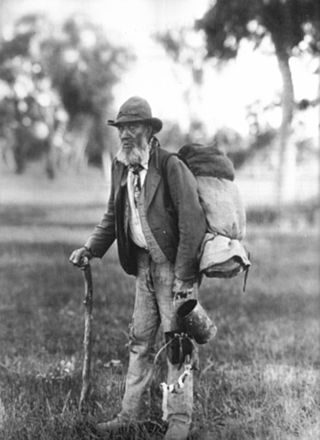
A swagman was a transient labourer who traveled by foot from farm to farm carrying his belongings in a swag. The term originated in Australia in the 19th century and was later used in New Zealand.

Smoking bans, or smoke-free laws, are public policies, including criminal laws and occupational safety and health regulations, that prohibit tobacco smoking in certain spaces. The spaces most commonly affected by smoking bans are indoor workplaces and buildings open to the public such as restaurants, bars, office buildings, schools, retail stores, hospitals, libraries, transport facilities, and government buildings, in addition to public transport vehicles such as aircraft, buses, watercraft, and trains. However, laws may also prohibit smoking in outdoor areas such as parks, beaches, pedestrian plazas, college and hospital campuses, and within a certain distance from the entrance to a building, and in some cases, private vehicles and multi-unit residences.
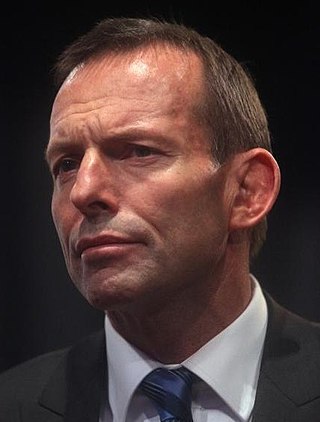
Anthony John Abbott is an Australian former politician who served as the 28th prime minister of Australia from 2013 to 2015. He held office as the leader of the Liberal Party of Australia and was the member of parliament (MP) for the New South Wales division of Warringah from 1994 to 2019.
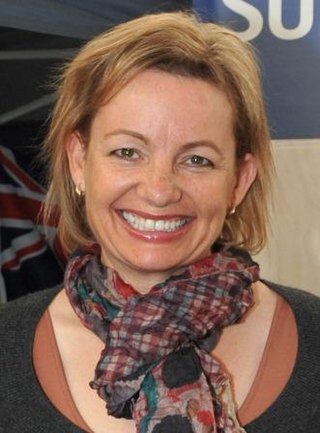
Sussan Penelope Ley is an Australian politician who has been deputy leader of the Liberal Party and Deputy Leader of the Opposition since May 2022. She has been member of parliament (MP) for the New South Wales seat of Farrer since 2001 and was a cabinet minister in the Abbott, Turnbull and Morrison governments.

Nicholas Hugh Minchin is an Australian former politician and former Australian Consul-General in New York, USA. He previously served as a Liberal member of the Australian Senate representing South Australia from July 1993 to June 2011, and a former cabinet minister in the Howard government.
A sheep shearer is a worker who uses (hand-powered)-blade or machine shears to remove wool from domestic sheep during crutching or shearing.
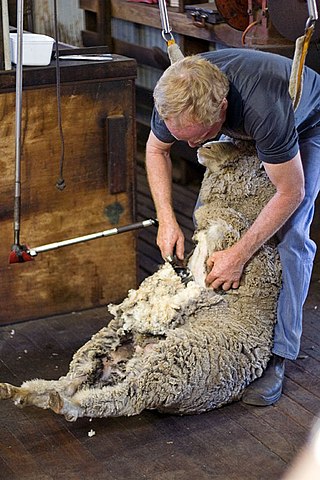
Sheep shearing is the process by which the woollen fleece of a sheep is cut off. The person who removes the sheep's wool is called a shearer. Typically each adult sheep is shorn once each year. The annual shearing most often occurs in a shearing shed, a facility especially designed to process often hundreds and sometimes more than 3,000 sheep per day. A working group of shearers and accompanying wool workers is known as a shearing gang.

The 1891 shearers' strike is one of Australia's earliest and most important industrial disputes.
In Australia, a sly-grog shop is an unlicensed hotel, liquor-store or other vendor of alcoholic beverages, sometimes with the added suggestion of selling poor-quality products. From the time of the First World War until as late as the 1960s, much of Australia had early closing of hotels and pubs serving alcoholic beverages. The term is also used to denote illegal sales in Indigenous areas where alcohol has been banned or restricted.
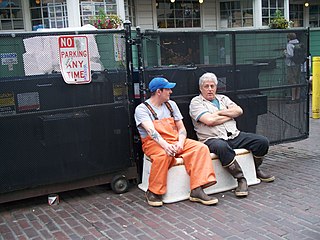
A break at work is a period of time during a shift in which an employee is allowed to take time off from their job. It is a type of downtime. There are different types of breaks, and depending on the length and the employer's policies, the break may or may not be paid.

A joint is a rolled cannabis cigarette. Unlike commercial tobacco cigarettes, the user ordinarily hand-rolls joints with rolling papers, though in some cases they are machine-rolled. Rolling papers are the most common rolling medium in industrialized countries; however, brown paper, cigarettes or beedies with the tobacco removed, receipts and paper napkin can also be used, particularly in developing countries. Modern papers are manufactured in a range of sizes from a wide variety of materials including rice, hemp, and flax, and are also available in liquorice and other flavoured varieties.
Smoking bans in private vehicles are enacted to protect passengers from secondhand smoke and to increase road traffic safety, e.g. by preventing the driver from being distracted by the act of smoking. Smoking bans in private vehicles are less common than bans extended to public transport or vehicles used during work, like trucks or police cars.
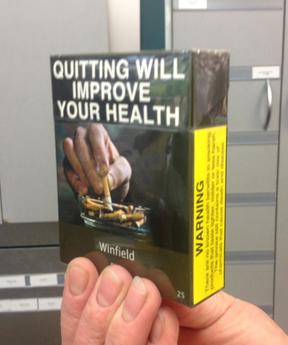
Plain tobacco packaging, also known as generic, neutral, standardised or homogeneous packaging, is packaging of tobacco products, typically cigarettes, without any branding, including only the brand name in a mandated size, font and place on the pack, in addition to the health warnings and any other legally mandated information such as toxic constituents and tax-paid stamps. The appearance of all tobacco packs is standardised, including the colour of the pack.

There are approximately 61.4 million smokers in Indonesia, among a population of 273 million people. Around 63% of men and 5% of women report smoking, equating to 34% of the population. The majority, 88% of Indonesian smokers, use clove-flavoured kreteks. Kretek manufacturers directly employ over 180,000 people in Indonesia and an additional 10 million indirectly. Indonesia is the fifth largest tobacco market in the world, and in 2008 over 165 billion cigarettes were sold in the country.
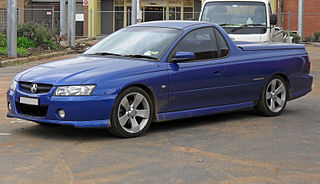
Diminutive forms of words are commonly used in everyday Australian English. While many dialects of English make use of diminutives and hypocorisms, Australian English uses them more extensively than any other. Diminutives may be seen as slang, but many are used widely across the whole of society. Some forms have also spread outside Australia to other English-speaking countries. There are over 5,000 identified diminutives in use in Australian English.

Terms related to cannabis include:

The Chats are an Australian punk rock band that formed in 2016 in the Sunshine Coast, Queensland. They describe their sound as "shed rock". The current band lineup is composed of guitarist Josh Hardy, drummer Matt Boggis, and bassist and vocalist Eamon Sandwith. Known for their songs about Australian culture, they initially went viral for their song "Smoko" and its music video in 2017, and later with "Pub Feed" in 2019. To date they have released two EPs, The Chats (2016) and Get This in Ya!! (2017), and two studio albums High Risk Behaviour (2020) and Get Fucked (2022).

Barbara Ann Pocock AM is an Australian politician and economist. She is a member of the Australian Greens and has been a Senator for South Australia since 2022. She is an emeritus professor of the University of South Australia and was previously deputy chair of The Australia Institute from 2004 to 2022.
















